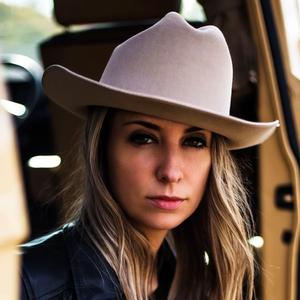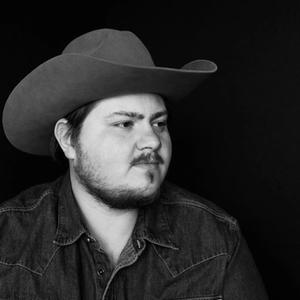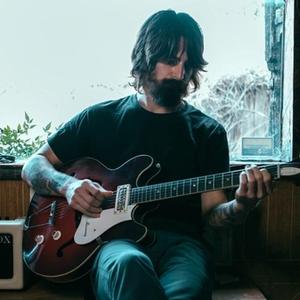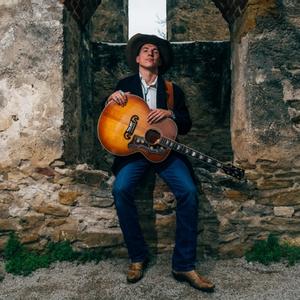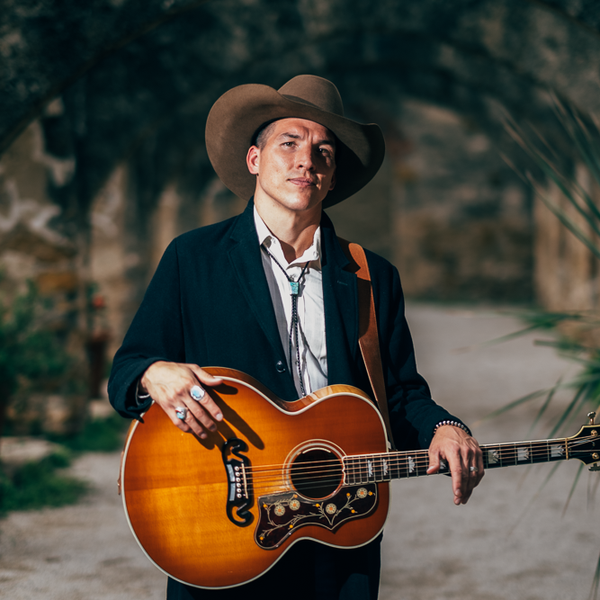




Link copied

“That was a wild period in my life. You know, kids I grew up with, they were going off to college and doing these normal, routine things” says Texas songwriter Dallas Burrow. “I was out there being a gypsy with some serious characters".
This comes moments after Burrow recounts a story about the Reverend Goat (born David Lee Carson), a self-proclaimed Cherokee shaman and musician who Burrow befriended after meeting on Kinky Friedman’s Texas ranch. He eventually helped move the Reverend back to New Orleans and wound up running around with a cast of characters and medicine men for a while. It was a wild period, to say the least. More than a decade ago, these New Orleans years left their impressions on Burrow and eventually, in part, became the central inspiration for his greasy blues rambler, ‘Born Down in Texas’, the lead single from his eponymous sophomore album.
Ever the embracing explorer, much of Dallas Burrow finds the gifted songwriter searching and surveying the ever-changing landscape within his life. At times, this is falling back into familiar treks and fabled adventures of his past - as on the aforementioned ‘Born Down in Texas’, the sweltering ‘Street Hustler’s Blues’ and road-weary ‘Outlaw Highway’. The folky American tales 'Country Girl’, ‘Independence Day’ and the lovely ‘River Road’ focus their lens on small-town nostalgia and feel warm, familiar, and inviting - often in juxtaposition to Burrow’s sharper, darker tales of rambling ways.
It’s here at these crossroads where Burrow thrives as a philosophical storyteller. In simplest terms, he captures these broad images of light and darkness within American folklore and tradition. More often than not, he uses himself as the vehicle to tell these tales, where you’ll find none better than ‘My Old Friend the Shadow’.
Still, it’s not always black and white. Burrow understands there are rarely absolutes in this world, lending us such context and understanding throughout. In songs such as ‘Father’s Son’, ‘Easter Sunday’ and ‘Holy Grail’, Burrow’s at his most vulnerable. As he explores these relationships further, it becomes even more evident that he’s a devoted father, son and partner.
Recorded with a stellar cast at The Bunker in Lockhart, Texas with stalwart producer Bruce Robison, Dallas Burrow glows warmly like a rural countryside sunset. Robust and organic, the 14-track collection finds the Texas folk singer delivering as strong and mighty a statement you’ll find this year. Burrow’s conviction is earnest and heartfelt throughout, and as we sit down to discuss the new album, it’s obvious that isn’t just evident within the artist, but the person as well.

You use a lot of familial touch-points on this record - a lot of landmark holidays, like Independence Day and Easter Sunday. Those seem to be scene setters - alongside the imagery of county fairs, fireworks, Easter morning and so on. Do you feel those help ground these songs in familiar settings?
I hope so. Those things resonate with people. ‘Easter Sunday’ in particular, I’d been traveling and recording up in Tennessee. When I came back to Texas, my family - my son and his mom - weren’t at home. They’d been in Los Angeles when I was out in Tennessee. I wrote that song as kind of a Hail Mary; I hoped I could send it to her and that it would strike a chord and get her to come back home - which it did. That one is super personal. Even when you’re writing something that’s very personal, you want it to have that universal accessibility that people will be able to hear and appreciate the sentiment behind.
During the pandemic, I was writing about stuff that I felt we were missing out on. That’s where ‘Independence Day’ came from. I grew up in New Braunfels, Texas; in small towns across America, you picture the Fourth of July as this holiday and vibe that transcends patriotism. We all look forward to it, but with the way things were last year, we weren’t going to get to go to the county fair, ride the Ferris Wheel and do all those things. I was trying to encapsulate those feelings.
One of the deeper themes of Dallas Burrow - and a reason for it being self-titled - is your transition from being a young man to becoming a father and how that relates to being a musician out on the road. You point back to those rambling days and at other moments, how you’re drawn to family. I wouldn’t characterize it as a struggle from one moment to another, but a transition nonetheless.
There are some of those growing pains. I’ve welcomed fatherhood, family and settling down. It’s not to say that being on the road and a traveling musician still isn’t a part of you. As an artist, we really romanticize those ideas and notions of identity. That’s an archetype - that idea of a bluesman or the troubadour. There’s American folklore attached to it, it’s a part of our culture and our mythology.
You mentioned previously that ‘Easter Sunday’ is about you, your fiancé and your son. A lot of these songs mention the relationships between father and son, whether that’s you and your son or you and father. Does writing about one of those relationships help you better understand the other and vice versa?
That’s an interesting question. I think it has to. It must. In general, I think being able to articulate these complex notions about our relationships helps you to understand yourself better. Within the family tree, it helps you understand your place in the grand scheme. Being able to appreciate some of these things about my relationship with my father does help me to better understand how I want to be a father to my own son and so forth. I’d say it helps solidify some of these ideas.
The album closer, ‘Outlaw Highway’, is rooted in a poem that your father began writing. What inspired you to put that to music and develop it into a song?
I can remember being a little kid, coming into the living room where my dad would be sitting around playing the guitar and shuffling through the papers with all his poems and songs on. That’s played such a huge role and has long inspired me. He was never a professional performer or anything, but he was always just as serious about writing for himself if nothing else.
Now and again, he’ll come up with something that he’s found from his catalogue of stuff, and every once in a while, something really will catch my attention. This particular piece of writing, 'Outlaw Highway', he wrote on a typewriter probably 20 or 30 years ago, maybe longer. As soon as I read it, it just looked classic. To me, it was super authentic and I felt compelled to sit down with a guitar and set it to music. I immediately gravitated towards it.
Bruce Robison produced the album. Down at his studio in Lockhart, they record analog and onto tape. As he’d say, “no digital shenanigans”. Was there any anxiety or intimidation knowing this was going to be unfamiliar territory when it came to the recording process?
Absolutely. The first time I went out there, met Bruce, saw the studio, and played him some songs, I was totally nervous. But it’s kind of nice to feel that. It’s nice to get excited about something and to get those butterflies. Just being around a guy like Bruce, who has a great history of writing all these songs and working with all these other artists, definitely made me a little nervous. But ultimately, once we started working, all that went away.
It’s such an organic process with Bruce. With the analog recording process, you really can’t rush - it’s necessary to slow down. Did that help ease the nerves and help create a certain mood and tempo?
That’s very true. You definitely have to take your time and it does set a tone. Once you get settled in and start working out there, just digging into the songs, it gives everything a chance to breathe. It makes you listen to one other a lot more. There’s a very organic feeling - a warm and fuzzy thing happens. There’s also this natural bleed since you’re all recording in the same room. You’re capturing an experience.
“We all have a shadow. But that means the light is shining on us too”
You’re continuously trying to balance life out on the road with family life. The road can be a great place and is tied to your livelihood as an artist. Yet It can also corrupt. Sometimes, the temptations can be too strong and you can lose the path. In the song ‘My Old Friend the Shadow’, you really examine this balance. You find such great imagery in how shadows are cast because of light sources.
That song definitely deals with duality. I think it’s a universal theme - whether that’s the balance between the road and home, or light and darkness. Part of it comes from this thing that Carl Jung talks about. Paraphrasing here, but it’s something to the effect of “in every man’s heart, there is a shadow that extends all the way down to hell.” We’ve all got darkness in us, but the flipside of that is that we all have light in us as well. It’s sort of a gospel song in disguise. We all have a shadow. But that means the light is shining on us too.
Dallas Burrow's self-titled sophomore album is out now via Subliminal Hymnal Records. Watch the video for the single 'Country Girl' below.
Dallas is the featured cover star of Holler's Introducing Country playlist. Subscribe and listen below.



